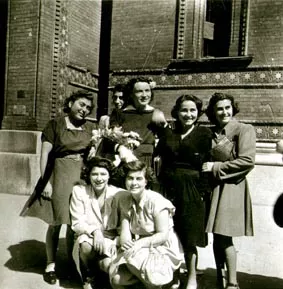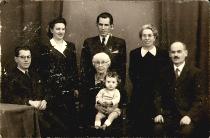This picture was taken at my wedding, in front of the Dohany Street Synagogue. This is the group of friends who were with me in Auschwitz. Me, Mrs. Janos Banyai, Stefania Mandy, Kati Horvath, Klari Hoffmann, Kati Winkler and the others. At my wedding in 1945, all of them laughed cheerfully. Though we should have cried at the wedding. We didn't cry because somebody always did something on purpose so there wouldn't be crying. I couldn't do anything to stop it, anyway. I was in a borrowed dress at my own wedding, I got it from my cousin's girlfriend. It wasn't ugly. She got a dark blue dress - there was an assistance program, and they loaned it to her. It was a Jewish wedding, we were married in the Dohany Street temple [synagogue]. There wasn't a white dress, nor a veil, just a dark-blue borrowed dress, and that was fine. I could buy new shoes, the shoes were my own. And beyond that, the two friends with me were my own. There was nothing to laugh at then, but we were cheerful, that we made it this far, that somebody among us was getting married. Who would have thought that we would somehow get home. Everyone just thought of death there, mainly when I saw the crematorium smoking. So I was the first to rush to get a husband. My husband quickly moved in, as soon as he got back from the work service. Anyway, I was already engaged before [the war]. Then everything was fine, because we were free. And we expected an easier life. We thought that if we get free of Auschwitz, then everything will be okay. Three or four months went by, since we got home, and I suddenly gained so much weight for my wedding. There were no relatives at my wedding. But that circle of friends was there, who were in Auschwitz with me. So this is how we looked three months after the war. We could eat already and we could smile. We had something to be glad about. That at last, something good is starting, a new life. Such loyal friendship can only be formed there [in Auschwitz]. I found a picture, where there weren't any relatives, just deportees, friends, who I made in Auschwitz. I keep in contact with the girls, who I was together with in Auschwitz. There were eight of us, and we loved each other so. We helped each other stay alive. That was good. We didn't withdraw in Auschwitz, a person found someone they could tell things to. All the bad things, difficult things? Aside from hauling bricks, it was good that we were there for each other, because we could talk a little to each other. One of the girls' uncle was a hospital director here in Pest. My girlfriend said, if you are going to give birth, go to my uncle. You don't have to pay, he'll arrange to have the birth done for free. A year after the war, it was still a really difficult world. I don't know whether I could have paid or not, and it felt good that she said it. As if I was part of a family.
Wedding photo of Olga Banyai
The Centropa Collection at USHMM
The Centropa archive has been acquired by the United States Holocaust Memorial Museum in Washington, DC.
USHMM will soon offer a Special Collections page for Centropa.
Academics please note: USHMM can provide you with original language word-for-word transcripts and high resolution photographs. All publications should be credited: "From the Centropa Collection at the United States Memorial Museum in Washington, DC". Please contact collection [at] centropa.org.













